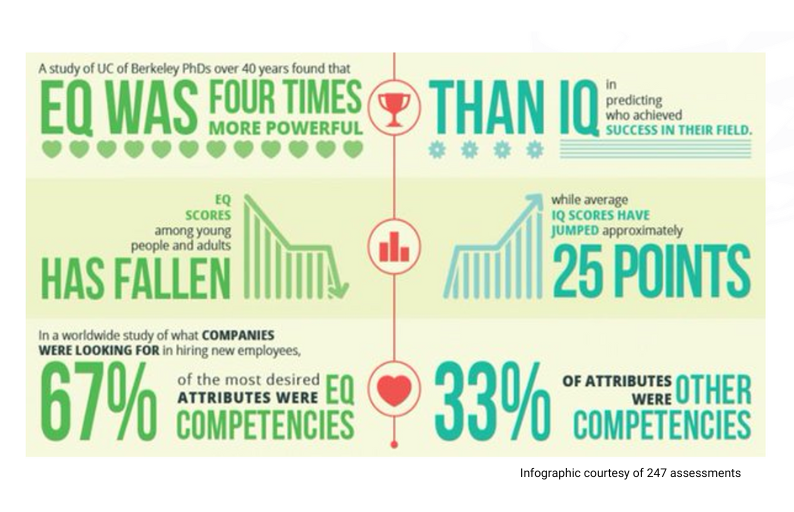In today’s ever-evolving business landscape, leadership is about more than just achieving targets or driving profitability. Leaders are increasingly expected to be emotionally attuned, empathetic, and compassionate—qualities that ensure both individual and collective well-being. At the core of this human-centred leadership is Emotional Intelligence (EIQ), a concept popularised by Daniel Goleman, and essential in building relationships that inspire trust, loyalty, and long-term success.
While traditional measures of intelligence, such as IQ, have long dominated the conversation around leadership and success, recent research has shown that EQ (Emotional Intelligence Quotient) plays a much more significant role. A study from UC Berkeley, spanning over 40 years, found that EQ was four times more powerful than IQ in predicting who would achieve success in their field. In fact, many companies today prioritise EQ competencies in their hiring processes, with 67% of the most desired attributes in new employees being related to EQ competencies.
Emotional Intelligence: A Modern Framework
At Lacuna Coaching, we approach Emotional Intelligence as a multi-faceted skill, breaking it down into four core components:
- Self-recognition – The ability to accurately identify and understand your emotions.
- Self-management – The capacity to regulate your emotional responses, ensuring they are constructive and aligned with your goals.
- Social recognition – The skill of recognising and understanding the emotions of others, allowing for better connection and empathy.
- Social management – The ability to manage relationships effectively, using empathy and emotional insight to build trust and inspire cooperation.
These dimensions are key to personal and professional success, as they help leaders not only understand their own emotional landscape but also navigate the complex emotional dynamics of their teams.
Recognising and Responding: The Essence of EIQ
At the heart of Emotional Intelligence is the ability to recognise emotions—both in ourselves and in others—and to respond in a way that builds stronger, more effective relationships. This concept is central to the way we work, where we focus on guiding leaders to tune into their emotions, understand their impact, and use this awareness to lead with authenticity and compassion.
By recognising our emotions, we gain deeper self-awareness, which is the foundation of strong leadership. It allows us to pause, reflect, and choose our responses carefully rather than reacting impulsively. For example, in stressful situations, an emotionally intelligent leader will acknowledge their feelings of frustration or anxiety but will regulate these emotions to ensure that their actions align with their values and objectives.
Equally important is recognising the emotions of others. A leader who can perceive and empathise with the emotional states of their team members can respond in ways that demonstrate care, understanding, and support. This, in turn, builds trust, enhances communication, and creates an environment where people feel valued.
Where Emotional Intelligence Meets Compassionate Leadership
Emotional Intelligence and Compassionate Leadership are two sides of the same coin. Compassionate leadership goes beyond recognising emotions—it’s about taking deliberate action to help others, improve well-being, and foster a culture of care. When leaders operate with high emotional intelligence, they not only recognise and understand the emotional needs of their team but are also driven to respond with kindness, empathy, and support.
Here’s how EIQ and compassionate leadership intersect in practice:
- Building Trust and Psychological Safety: Emotionally intelligent leaders understand how their words and actions impact others. When this understanding is paired with compassion, it leads to the creation of an environment where team members feel safe to express their thoughts and emotions without fear of judgement or punishment.
- Effective Conflict Resolution: Leaders with high EQ can recognise underlying emotions during conflicts, allowing them to address not just the surface-level issues but also the emotional tensions that may be driving the conflict. Compassionate leaders go a step further by facilitating open conversations and encouraging resolution that prioritises relationship-building over blame.
- Empowering and Inspiring Teams: Emotionally intelligent leaders are skilled at recognising individual strengths and challenges within their team. They use this insight to provide personalised support and encouragement, creating an atmosphere where people feel understood and motivated to contribute their best. When leaders combine this awareness with compassion, they inspire greater loyalty, engagement, and innovation.
- Resilience and Well-being: Leaders who can manage their own emotions effectively are better equipped to help their teams manage stress and adversity. Compassionate leaders take proactive steps to ensure their teams are supported, whether that means providing flexibility, offering encouragement, or simply being there to listen.
The Business Case for Emotional Intelligence
The benefits of Emotional Intelligence extend beyond personal relationships. Businesses led by emotionally intelligent leaders tend to outperform their competitors. Teams that operate in environments where compassion, understanding, and emotional awareness are prioritised experience higher levels of engagement, lower turnover, and greater productivity.
Moreover, as the infographic illustrates, while average IQ scores have risen by about 25 points in recent decades, EQ scores among young people and adults have actually fallen. This means that emotionally intelligent leadership is not just a competitive advantage—it’s an increasingly rare and sought-after trait. As organisations focus more on human-centred leadership models, the ability to lead with emotional intelligence will only become more essential.
Unlocking Your Leadership Potential
At Lacuna Coaching, we believe that Emotional Intelligence is one of the keys to unlocking authentic, compassionate leadership. Through assessments like the Emotional Intelligence 360, we help leaders identify their strengths and growth areas across the four core dimensions: self-recognition, self-management, social recognition, and social management.
By developing these competencies, leaders can create environments where their teams feel empowered, supported, and motivated to achieve not only professional success but also personal fulfilment. When leaders align emotional awareness with compassionate action, they bring out the best in themselves and those around them.
Ultimately, Emotional Intelligence is not just about recognising and managing emotions—it’s about building connections, fostering trust, and leading with heart. As we move into an increasingly complex and connected world, these qualities will define the future of effective leadership.



